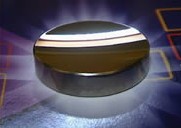Laser Beam
Products can fabricate, polish and coat mirrors from
customer supplied material, working to customers
drawings, or to their own designs using software
like Zemax, AutoCAD, BeamCAD. Their manufacturing
techniques lend themselves to the efficient
production of small numbers of optics, even just one
optical component, very cost effectively. Because
they manufacture almost entirely “ in house”
delivery times are quick as well.
They pride themselves in their flexibility with
mirror materials, optical coatings, mechanical and
optical tolerances, even adapting existing parts to
meet the demands of the customer's applications.
Just about everything is standard to them!
Applications for these mirrors include:
-
CO2 Lasers
-
Er: YAG Lasers
-
Near IR
-
Far IR
-
Quantum Cascade Lasers (QCL)
-
Phase Retarding CO2
Mirrors
Materials that work as substrates in these
applications are:
-
Copper
-
Aluminum
-
Silicon
-
Molybdenum
Standard coatings that Laser Beam products
uses are:
-
Gold
-
Max R
-
Polarization
-
Broadband
Both standard and custom items are available at
competitive prices and with short delivery times.
Flat Mirrors
 Flat
mirrors find wide uses in industrial laser systems,
as well as medical, scientific and research
applications. Flat
mirrors find wide uses in industrial laser systems,
as well as medical, scientific and research
applications.
Copper based mirrors in particular provide a
rugged and durable mirror with good reflectivity
across a broad spectrum of the infrared. Our
electroplated gold coating offers good reflectivity
and high damage resistance. They are widely used in
CO2 laser beam delivery where
their massive power handling ability gives a long
working life. Our mirrors are fitted to a 40KW
welding laser. For standard specifications click
here
Aluminium mirrors are lightweight, and ideal
for scanning applications.
Silicon mirrors are always used with a
coating, such as Max R, phase retarder, and are
suitable for many infra red wavelengths. Although
lightweight and stable they have lower laser damage
resistance compared to all metal mirrors.
Molybdenum mirrors offer a very hard,
scratch resistant, mirror surface.
Unique manufacturing methods allow cost effective
supply of prototypes and small numbers of parts
without tooling or set up charges.
- Money and time can be saved by having
mirrors designed with locating flanges, mounting
holes and even water cooling built in.
- Mirrors from most metals, metal alloys, and
some non metal such as silicon are routinely
manufactured.
- Mirrors from 6mm to 150mm diameter are
available, as well as square, rectangular, and
other custom shapes.
- Repair and refurbishing of used mirrors to
their original specification is also available,
which can offer considerable savings.
 Curved
Mirrors Curved
Mirrors
Spherically curved mirrors are commonly used
in laser cavities and in laser beam expanders for
high power lasers.
- A large range of concave and convex mirrors
with radius of curvature from 5mm to 100 meters
are available.
- Spherical mirrors can often be used in
careful combination to give diffraction limited
results.
- Several designs for focus systems based on
spherical mirrors are available.
Cylindrical mirrors are used for correcting
astigmatic beams from slab discharge lasers and
laser diodes. A range of cylindrical curvatures are
available.
Curved mirrors with through holes are useful in
Raman spectroscopy and multi-pass cells. Surface
form is maintained over the entire surface.
Using spherical mirrors in carefully optimized
designs can offer large savings over aspheric
optics.
- A range of parabolic, elliptical and
hyperbolic mirror surfaces are available for
applications requiring an aspheric mirror.
Curved mirrors are available from a wide range of
materials and with various coatings.
Application Notes (PDFs):
Copper Mirrors vs. ZnSe Lenses for High Power Lasers
Applications: CO2 lasers, Cut/Weld, Pulsed
Laser, ER:YAG, Infrared
Assemblies: Collimation, Focus Units,
Polarization, Beam Control
Quality: Interferometry, Polishing,
Calorimetry, Laser Damage
Technical: Choosing mirrors, laser damage,
specifications, cleaning mirrors, surface quality
|